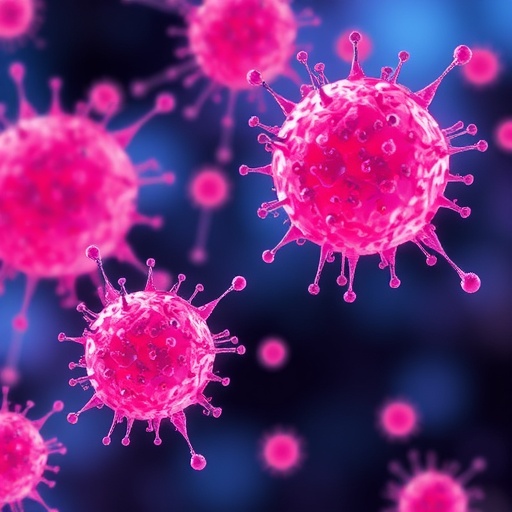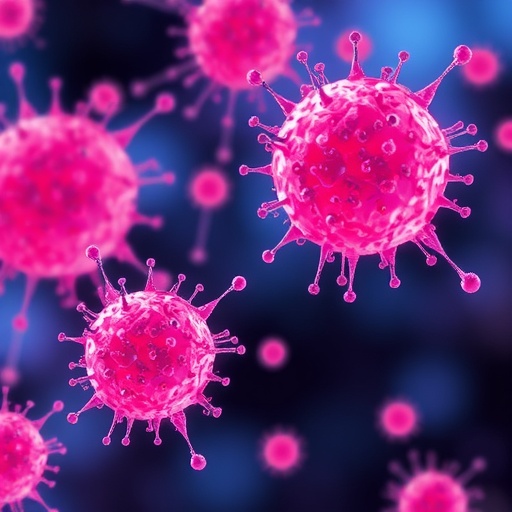
Recent research has unveiled a groundbreaking connection between tumor biology and the microbial inhabitants residing within tumors, a discovery that could revolutionize cancer therapy. Scientists are now starting to recognize that bacteria, often considered mere bystanders in the human body, may play an active role in the development and treatment of cancer. This paradigm shift in understanding is primarily rooted in the work led by researchers such as Luo, Huang, and Wang, who are at the forefront of this captivating field of study. They have published a detailed account of these advancements in their forthcoming article in “Military Medicine Research”, highlighting the potential applications of tumor-resident bacteria in enhancing cancer therapies.
The growing realization that tumor-associated bacteria can influence tumor progression has opened new avenues for exploration. Traditionally, cancer treatments such as chemotherapy and radiation have focused solely on the tumor cells themselves, often ignoring the surrounding microenvironment, including bacteria. However, increasing evidence suggests that the microbiome, particularly within tumors, can not only affect tumor growth but also patient responses to therapies. The intricate relationship between these bacteria and host interactions lays the groundwork for redefining therapeutic strategies aimed at improving efficacy and minimizing adverse effects.
The research conducted by Luo et al. delves into various mechanisms by which tumor-resident bacteria can modulate the immune response. These microorganisms may produce metabolites that either stimulate or suppress the activity of immune cells. For instance, certain bacterial species have been shown to amplify the anti-tumor immune response, potentially leading to improved outcomes in immunotherapy. This insight could prove invaluable, offering a way to leverage the body’s natural defenses in the fight against cancer.
Additionally, a crucial aspect of the study highlights how bacteria can influence the tumor microenvironment, altering factors such as pH and oxygen levels, which can affect drug delivery and efficacy. The presence of specific bacteria may enhance the permeability of tumor blood vessels, thereby facilitating the accumulation of therapeutic agents within tumors. Understanding these dynamics presents an opportunity to enhance the delivery of conventional therapies through the strategic manipulation of the tumor microbiome.
The team also discusses the potential for engineered bacteria to be used as vehicles for targeted drug delivery to tumor sites. Such bacteria could be designed to carry therapeutic agents directly to the tumor, effectively minimizing systemic toxicity and enhancing treatment precision. This innovative approach aligns with the concept of personalized medicine, where therapies are tailored to the unique molecular and microbial profile of each patient’s tumor.
Given the rapid advances in synthetic biology, it is now feasible to tailor bacteria to express specific therapeutic genes or proteins in response to tumor-specific signals. This ability to harness the inherent capabilities of bacteria to respond to the tumor environment poses a transformative approach to cancer treatment. Luo and colleagues outline the necessity for multidisciplinary collaboration in this field, combining insights from microbiology, oncology, and genetic engineering to unlock the full potential of tumor-resident bacteria.
While the therapeutic implications are exciting, Luo et al. also emphasize the importance of understanding the safety and ethical considerations surrounding the use of bacterial therapies. Rigorous preclinical and clinical evaluations will be necessary to ensure that such treatments do not result in detrimental effects, such as unintended infections or immune complications. Developing a thorough understanding of the interactions between bacteria and the human host system will be paramount in advancing these therapies from bench to bedside.
Furthermore, as cancer therapy evolves, researchers are beginning to explore the implications of the microbiome beyond tumors. It is becoming evident that the gut microbiome, for instance, may significantly influence how patients respond to various cancer treatments. The interplay between tumor-resident bacteria and the gut microbiome could unveil broader therapeutic strategies that encompass both local tumor control and systemic immunity.
Recent findings about the microbiome’s role in drug metabolism further complicate our understanding of treatment efficacy. Certain bacteria can metabolize chemotherapy drugs, altering their effectiveness. This revelation underscores the necessity for integrated approaches that assess both the tumor-associated microbiome and the patient’s gut microbiome to predict treatment responses accurately.
The integration of microbiome analysis into cancer research and treatment also calls for the development of novel diagnostic tools. Identifying specific bacterial populations within tumors could provide important prognostic insights. As such, future clinical trials may need to incorporate microbiome profiling as part of their standard practice to identify potential therapeutic and predictive markers.
This exciting research stands at the intersection of multiple scientific disciplines, showcasing the potential for novel cancer therapies that leverage the capabilities of the microbiome. As the boundaries of cancer treatment continue to expand, the findings from Luo, Huang, and Wang may represent but the tip of the iceberg in exploring how we can manipulate biological systems to better combat disease. The implications of these advancements are vast, likely extending well beyond oncology, potentially offering therapeutic insights applicable to a variety of diseases influenced by microbial interactions.
The emergence of tumor-resident bacteria as significant players in cancer therapy could prompt a re-evaluation of current treatment paradigms and foster innovative therapeutic methodologies. Existing clinical approaches may be augmented by developing synergistic treatments that combine conventional therapies with microbiome-modulating strategies. This outlook provides a hopeful perspective for the future of cancer treatment, emphasizing the necessity for continual exploration and understanding of the complex interplay between human health and microbial life.
In conclusion, the ongoing research on tumor-resident bacteria, notably highlighted by the work of Luo et al., paves the way for a novel frontier in cancer therapy that leverages the capabilities of our microbial companions. As researchers continue to unravel the complexities of these interactions, the scientific community anticipates a transformation in how cancer is understood and treated, potentially leading to breakthroughs that could significantly enhance patient outcomes and survival rates.
Subject of Research: Tumor-resident bacteria and their application in cancer therapy
Article Title: Advancements in understanding tumor-resident bacteria and their application in cancer therapy
Article References:
Luo, YC., Huang, XT., Wang, R. et al. Advancements in understanding tumor-resident bacteria and their application in cancer therapy. Military Med Res 12, 38 (2025). https://doi.org/10.1186/s40779-025-00623-1
Image Credits: AI Generated
DOI:
Keywords: Tumor-resident bacteria, cancer therapy, microbiome, immunotherapy, drug delivery, personalized medicine, synthetic biology, microbiome profiling.
Tags: bacterial role in cancer developmentcancer treatment paradigm shiftchemotherapy and microbiome interactionsenhancing cancer therapies with bacteriainnovations in cancer therapymicrobial inhabitants in tumorsmicrobiome influence on tumor progressionMilitary Medicine Research article on tumor bacteriapatient responses to cancer therapiesradiation therapy and tumor microenvironmenttumor bacteria in cancer treatmenttumor-associated bacteria research



